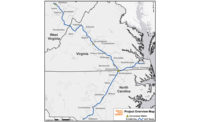Draft Deal Restarts Work on Disputed $5B British Columbia Gas Pipeline
The Canadian government and a First Nations tribe have reached a proposed agreement in a dispute over the nearly $5-billion Coastal GasLink natural gas pipeline in British Columbia. The pact, which must be reviewed and approved by members of the Wet’suwet’en Nation, may end several weeks of solidarity protests that interrupted passenger and freight rail service across Canada.
TC Energy of Calgary began construction early last year on the 416-mile pipeline connecting fracking operations around Dawson Creek with an LNG Canada facility on the British Columbia coast.
Details of the draft agreement, which focuses on Indigenous land rights, were not disclosed. But in a joint statement, representatives of Wet’suwet’en Nation, B.C. and Canada acknowledged they had not settled all pipeline issues.
“While much has been accomplished, much work remains," said Coastal GasLink President David Pfeiffer
According to the company’s website, the project route “is fully permitted and is the result of rigorous fieldwork and consultation with Indigenous and local communities.” The company cites a route adjustment made to protect sensitive cultural and environmental areas, but adds that “any significant change to the route at this stage would not allow the project to be successful.”
While a majority of the Wet’suwet’en Nation’s elected band councils approved the pipeline, many of the tribe’s hereditary chiefs, who also hold a leadership role, have been steadfastly opposed to the project’s location in their traditional territory, located in northern British Columbia. In addition to concerns about to the pipeline’s potential effect on climate change and the environment, the chiefs have also demanded resolution to unsettled land title and tribal representation issues, and the absence of a treaty covering traditional land.
The dispute intensified as TC Energy began construction on Wet’suwet’en land earlier this year.
Blockades erected across a forest service road to the construction site inspired similar protests that obstructed rail lines in Toronto, Montreal and Ottawa. Although British Columbia had ordered TC Energy to pursue further consultations with the hereditary chiefs before continuing work, the solidarity protests continued to spread and intensify.
Provincial and federal officials had been meeting with chiefs since Feb. 27 to resolve the dispute. The chiefs came to the negotiating table after TC Energy agreed to suspend work nearby. The Royal Canadian Mounted Police, which has been on site since early February to enforce an injunction providing access to the construction site, also agreed to discontinue patrols nearby while talks were underway.
British Columbia Indigenous Relations Minister Scott Fraser said on March 1 that the negotiationswould yield a protocol to deal with similar infrastructure projects in the future.




